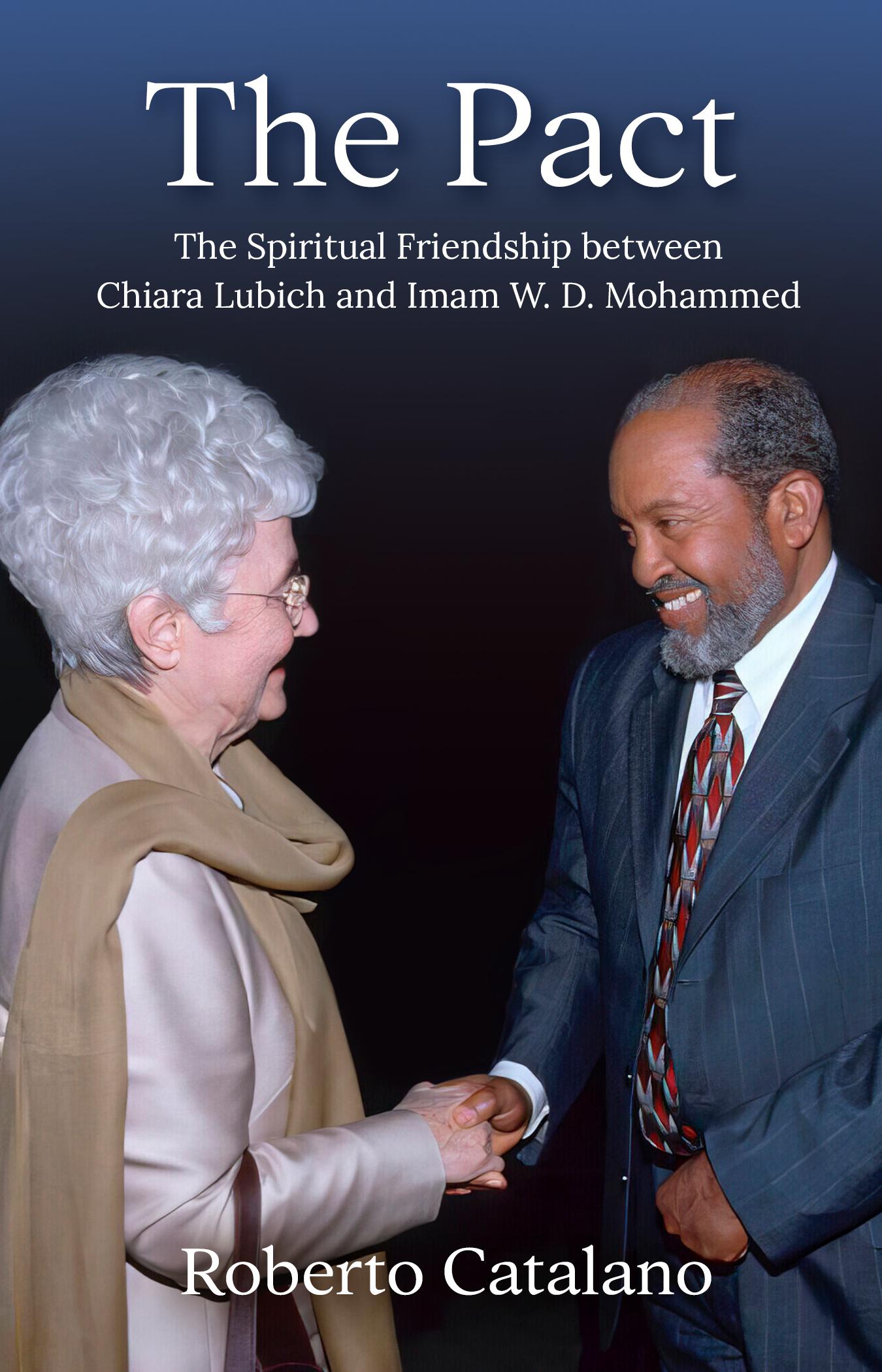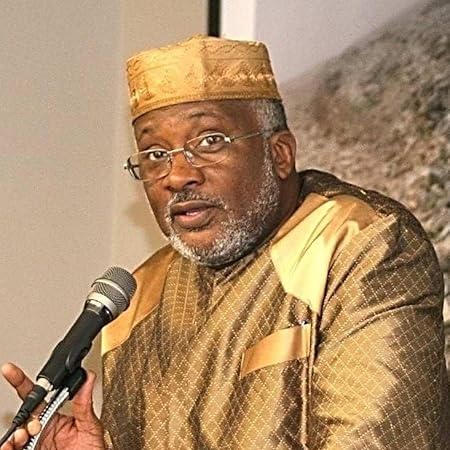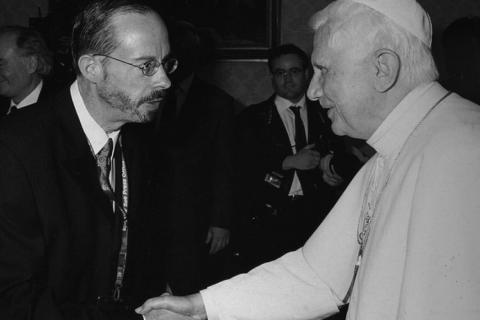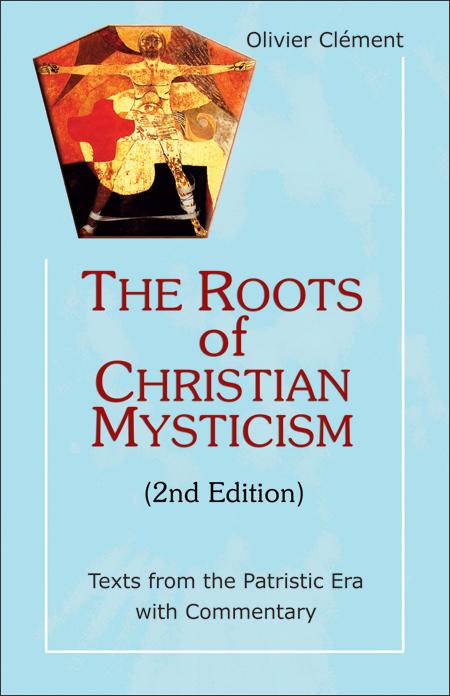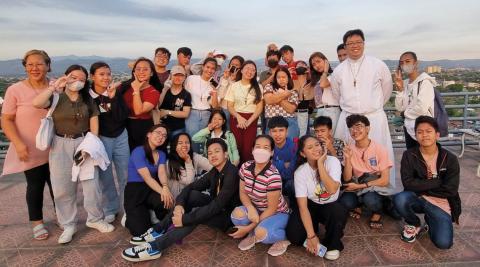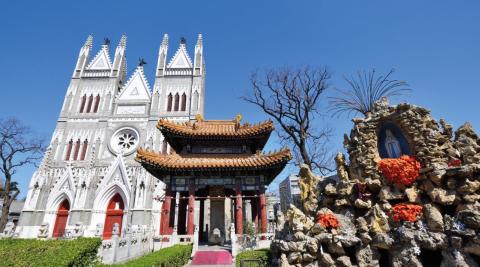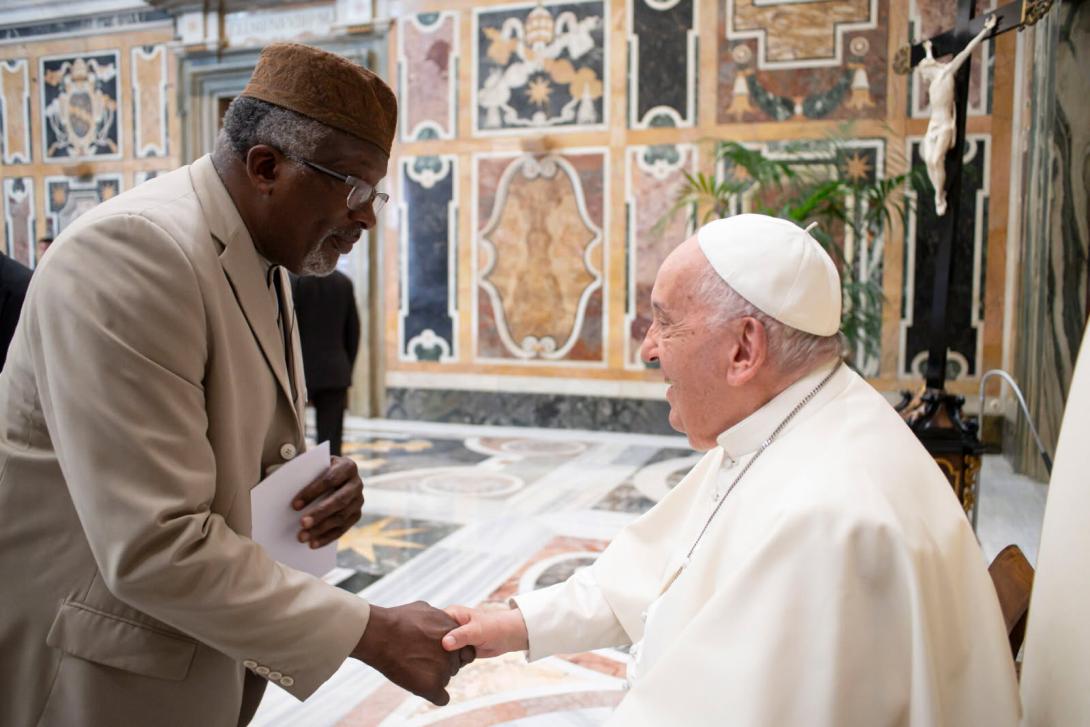
Imam Mikal Saahir with Pope Francis
I am thankful to Allah for the papacy of Pope Francis. In him one could see beautiful examples of Christian love that the Qur’an (chapter 5, verse 82) speaks of. He was humble and studious, and even though he was in the world of man, he was not a worldly man.
Prophet Muhammed, the prayers and the peace be upon him (ppbuh) recognized this “Christian love” mentioned in the Qur’an. He signed many treaties with the People of the Book (Jews and Christians). His treaty with the Christian monks of Saint Catherine’s Monastery (albeit Greek Orthodox), guaranteeing them freedom of religion and protection by all Muslims, is often cited by Islamic historians. This fraternity of universal brotherhood was continued by Imam W. Deen Mohammed and Chiara Lubich of the Focolare Movement, thus obligating Muslim African Americans to continue this divine tradition, via dialogue, with our Catholic brothers and sisters—a sacred tradition that is part and parcel of Pope Francis.
All Muslims are obligated to view the world and world leaders based on two Islamic sources. First, upon the teachings of the Qur’an. Second, we must relate to humanity and world leaders in the manner exemplified by Prophet Muhammed (ppbuh). Whenever engaged in any situation or discourse no Muslim is ever exempt from relying on these two sources of Islamic guidance.
His Holiness, Pope Francis, based on these same sources, shines brightly in the hearts, minds, and souls of many Muslims, especially the students and followers of the teachings of Imam W. Deen Mohammed, who applauded the papacy for not just working for the betterment of Catholicism, but for all people. Speaking in Milwaukee, Wisconsin in 1987, Imam Mohammed said, “We have to respect them, when they carry the heavy responsibility for many, many people. For many, many people. And especially when they serve goodness, serves justice, and serves excellence in the life of man.” He added, “I respect him and honor him. Yes, I have great respect for the Catholics, great respect for Pope John Paul II, great respect, so much respect and admiration that I've been thinking how I could meet him, go on to the Vatican, ask him for an invitation one day.”
I have a deep appreciation for Pope Francis’ papacy. We witnessed his world leadership based on ecumenical dialogue with people of many faiths. I am thankful for him establishing a pattern that diligently sought inclusion without compulsion. He demonstrated that dialogue must be established upon mutual respect, without any participants’ acquiescence of personal commitment to their respective religion or their natural cultural inheritances.
Muslims are called to be a people of faith, believers who engage all of humanity in conversation and community exchange. This is best achieved through the type of dialogue that identifies and corrects the many man-made barriers that may hinder our progress towards a collective human excellence.
Pope Francis, in his book Let Us Dream: The Path to a Better Future, acknowledges the importance of dialogue that recognizes but is not hindered by boundaries.
To be Christian, then, is to know that we are part of a people, a people expressed in different nations and cultures yet which transcends all boundaries of race and language. The People of God is a community within the broader community of a nation, serving the nation, helping to shape that nation’s self-understanding, while respecting the role played by other religious and cultural institutions. But if the Church has a particular role to play at times of crisis, it is precisely to remind the people of its soul, of its need to respect the common good. This is what Jesus did: He came to strengthen and deepen the bonds of belonging—of the people to God and to each other. That is why the one who matters most in the Kingdom of God is whoever makes himself least, serving others (Matthew 20:26–27), and especially the poor.
Christians will call it the “Christ-nature”. We call it “Muslim.” We are talking about the same thing. We have been created for the same thing.
Pope Francis earned the distinguished title, “The People’s Pope.” This is a fitting honor for a man whose willingness and ability to meet all people where they are is dynamic, refreshing and right for the times in which we live.
As a Muslim, particularly as a student of Imam W. Deen Mohammed, I am obligated to obey the Qur’an and the follow the life modeled by Prophet Muhammed (ppbuh). Pope Francis encouraged a person or a group to come out of their silos or their “comfort zones,” and to comfortably step, however briefly, into the other’s comfort zones in order to experientially savor an educational encounter to the point of momentarily “becoming as one.” Pope Francis’ leadership made these interfaith “moments of oneness” a reality for many.
Beginning with our father Adam, all human beings are related and interconnected. Therefore, the Qur’an in chapter 3, verse 64 instructs humanity to “come together on common terms.” This is the message of the prophets—that we honor our commonalities while respecting our diversity. Christ Jesus said, “…you in Me, and I in you.” Prophet Muhammed said, “We all are the children of Adam.”
Imam W. Deen Mohammed once delivered an address titled, “The Common Good and the Common Destiny,” in which he said:
Brother Muslims and Sister Muslims who are here, our Prophet (Muhammed) is pointing to the same excellence, purity and goodness that G_d put in Christians, Jews and Muslims. Christians will call it the “Christ-nature”. We call it “Muslim.” We are talking about the same thing. We have been created for the same thing. We are to be conscious of that life and have respect for that life and build on that life, so that it will grow and become more useful for ourselves and more useful for mankind.
Pope Francis also spoke about this universal human commonality. While acknowledging the sad reality that hatred and division are often promoted by the media, he instead focused on the human goodness of mankind that is common in all religions. “There is a hidden sea of goodness that is growing and leads us to hope in dialogue, reciprocal knowledge and the possibility of building, together with the followers of other religions and all men and women of goodwill, a world of fraternity and peace,” he said.
By recognizing a “hidden sea of goodness,” His Holiness, Pope Francis inspired hope and trust and demonstrated unifying characteristics. His papacy was filled, much like his predecessor Pope John Paul II’s, by traveling abroad in dialogue with people of faith. Their willingness to come into the midst of humanity while not disturbing the comfort zones of others to deliver a clear message of Christ’s love spoke to unity, love, respect, and inclusion.
We saw in Pope Francis a modern-day living example of the Qur’an verse that reads, “…and nearest among them in love to the believers wilt thou find those who say, ‘We are Christians’: because amongst these are men devoted to learning and men who have renounced the world, and they are not arrogant.” (Qur’an 5:82)
If you enjoyed this article, you might like...


